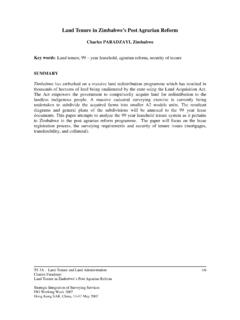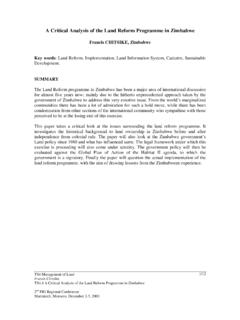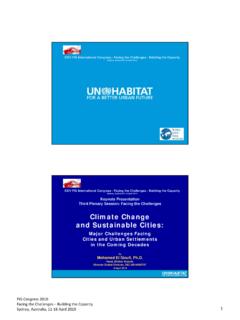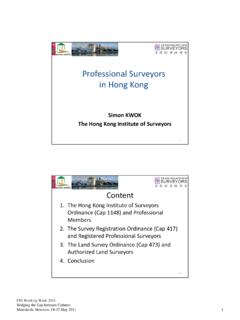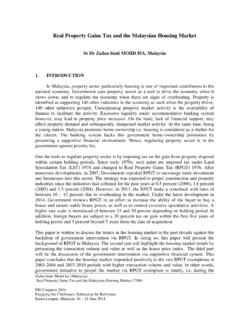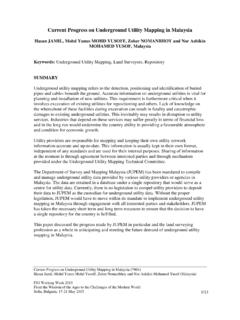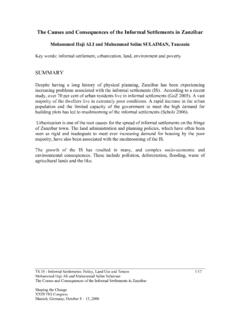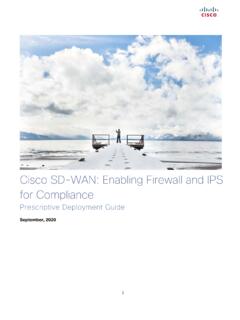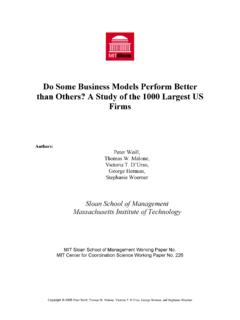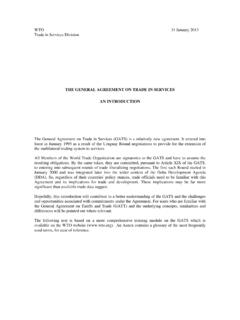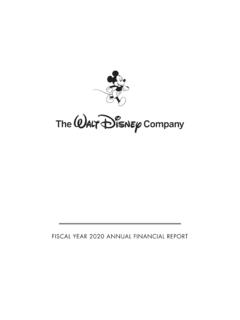Transcription of LIFELONG LEARNING - Education and Training
1 TS05I - LEARNING and Teaching Methodology, 5945 1/14 Soni Stella LIFELONG LEARNING - Education and Training FIG Working Week 2012 Knowing to manage the territory, protect the environment, evaluate the cultural heritage Rome, Italy, 6-10 May 2012 LIFELONG LEARNING - Education and Training Stella SONI, Nigeria. Key Words: LIFELONG LEARNING , Education , Training . ABSTRACT THE ILLITERATES OF THE 21st CENTURY WILL NOT BE THOSE WHO CANNOT READ AND WRITE BUT THOSE WHO CANNOT LEARN, UNLEARN AND RELEARN - Alvin Tofler LIFELONG LEARNING is about acquiring and updating all kinds of abilities, interests, knowledge and qualifications from the pre-school years to post retirement which promotes the development of knowledge and competences that will enable adaptation to the knowledge-based society and also valuing all forms of LEARNING .
2 LEARNING can no longer be dichotomized into a place and time to acquire knowledge (school) and a place and time to apply knowledge (the workplace). Today s students are flooded with more information than they can handle, and tomorrow s workers will need to know far more than any individual can retain. LIFELONG LEARNING is an essential challenge for inventing the future of our societies; it is a necessity rather than a possibility or a luxury to be considered. LIFELONG LEARNING is more than adult Education and/or Training it is a mindset and a habit for people to acquire. This presentation identifies essential elements for coherent and comprehensive LIFELONG LEARNING strategies viz.
3 Partnership working, insight into demand for LEARNING , adequate resourcing involving a substantial increase in public and private investment in LEARNING , facilitating access to LEARNING opportunities, creating a LEARNING culture and striving for excellence through introduction of quality control and indicators to measure progress. These approaches need new media and innovative technologies to be adequately supported. A theory of LIFELONG LEARNING must investigate new frameworks to LEARNING required by the profound and accelerating changes in the nature of work and Education . These changes include (1) an increasing prevalence of high-technology jobs requiring support for LEARNING on demand because coverage of all concepts is impossible; (2) the inevitability of change in the course of a professional lifetime, which necessitates LIFELONG LEARNING ; and (3) the deepening (and disquieting) division between the opportunities offered to the educated and to the uneducated.
4 On the basis of the feedback relating to the key messages six priorities for action have been identified: (1) valuing LEARNING , (2) providing information, guidance and counseling, (3) investing time and money in LEARNING , (4) bringing together learners and LEARNING opportunities, (5) ensuring basic skills and (6) introducing innovative pedagogy. This paper explores conceptual frameworks and innovative computational environments to support LIFELONG LEARNING and it analyzes why Training approaches need to be transcended and how this can be done. TS05I - LEARNING and Teaching Methodology, 5945 2/14 Soni Stella LIFELONG LEARNING - Education and Training FIG Working Week 2012 Knowing to manage the territory, protect the environment, evaluate the cultural heritage Rome, Italy, 6-10 May 2012 LIFELONG LEARNING - Education and Training Stella SONI, Nigeria.
5 1. INTRODUCTION According to the European commission, the scale of current economic and social change, the rapid transition to a knowledge-based society and demographic pressures resulting from an ageing population in Europe and the rest of the world are all challenges which demand a new approach to Education and Training , within the framework of LIFELONG LEARNING . Information overload, the advent of high-functionality systems, and a climate of rapid technological change have created new problems and challenges for Education and Training .
6 More and more knowledge, especially advanced knowledge, is acquired well past the age of formal schooling, and in many situations through educational processes that do not center on the traditional school [Illich, 1971]. LEARNING needs to be examined across the lifespan because previous notions of a divided lifetime Education followed by work are no longer tenable [Gardner, 1991]. Professional activity has become so knowledge-intensive and fluid in content that LEARNING has become an integral and irremovable part of adult work activities. LEARNING is a new form of labor [Zuboff, 1988], and working is often (and needs to be) a collaborative effort among colleagues and peers.
7 In the emerging knowledge society, an educated person will be someone who is willing to consider LEARNING as a LIFELONG process. LEARNING should be part of living, a natural consequence of being alive and in touch with the world, and not a process separate from the rest of life [Rogoff & Lave, 1984]. What learners need, therefore, is not only instruction but access to the world (in order to connect the knowledge in their head with the knowledge in the world [Norman, 1993] and a chance to play a meaningful part in it. School LEARNING and workplace LEARNING need to be integrated.)
8 2. CONCEPTS OF LIFELONG LEARNING Common themes conveyed in literature on LIFELONG LEARNING articulate four characteristics which transform Education and Training into the concept of LIFELONG LEARNING . Informal LEARNING The first characteristic of LIFELONG LEARNING is that it encompasses both formal and non-formal/informal types of Education and Training . Formal LEARNING includes the hierarchically structured school system that runs from primary school through the university and organized school-like programs created in business for technical and professional Training .
9 Whereas informal LEARNING describes a LIFELONG process whereby individuals acquire attitudes, values, skills and knowledge from daily experience and the educational influences and resources in his TS05I - LEARNING and Teaching Methodology, 5945 3/14 Soni Stella LIFELONG LEARNING - Education and Training FIG Working Week 2012 Knowing to manage the territory, protect the environment, evaluate the cultural heritage Rome, Italy, 6-10 May 2012 or her environment, from family and neighbors, from work and play, from the market place, the library and the mass media. [Conner, 2009] Self-motivated LEARNING There is a heavy emphasis on the need for individuals to take responsibility for their own LEARNING .
10 LIFELONG learners are, therefore, not defined by the type of Education or Training in which they are involved, but by the personal characteristics that lead to such involvement. Cassandra B. Whyte emphasized the importance of locus of control and successful academic performance.[Whyte, 1978] [Lauridsen and Whyte1980]Personal characteristics of individuals who are most likely to participate in LEARNING , either formally or informally throughout their lives, have acquired: - The necessary skills and attitudes for LEARNING , especially literacy and numeracy skills; - The confidence to learn, including a sense of engagement with the Education and Training system; and - Willingness and motivation to learn.
